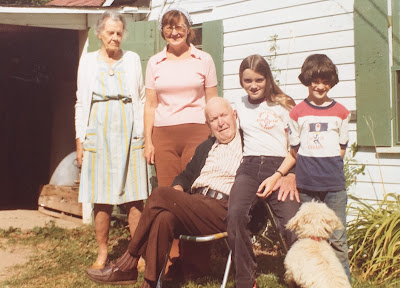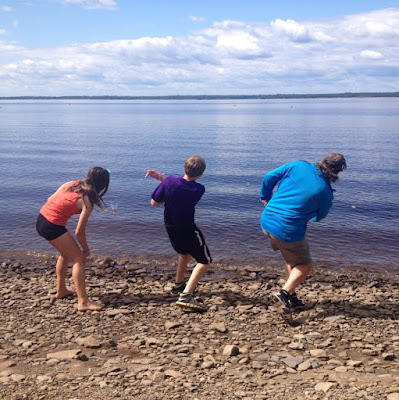 |
| The 8-ball charm on my "Treasured Hearts" bracelet. |
Almost six years ago at my father's funeral I reconnected with cousins that are 20 years older than me. We were talking about my grandmother Holmes, and I recalled her Magic 8-ball. I remembered how she would take this 8-ball out of the deep recesses of a linen closet, with great reverence, and let us ask a question of the Magic 8-ball. We would then turn it over and wait for the answer to magically float to the surface. My cousin John said that she managed to maintain that magic by only letting you ask one question before putting it away until the next visit. I hadn't been aware of that subterfuge, but when I saw that Pandora had an 8-ball charm I knew it was the perfect charm to have in remembrance of my Granny.
If you're not familiar with the Magic 8-ball, see what happens when Woody asks a question in this clip from Toy Story:
When my father was just six years old he lost his mother who had died during childbirth. His father remarried when my dad was 13, giving my dad a stepmother.
Knowing I had this retired Pandora charm coming in the mail I did a little research on my grandmother, Vera Brown Holmes - I Googled her. She was born in 1890, the daughter of a country doctor and attended a private boarding school for girls. She finished high school in 1906 and then studied at Royal Victoria College, which was the women's college (where women both lived and studied) at McGill University in Montreal.
 |
| Royal Victoria College 1911 |
 |
| "College Life" at R.V.C. |
 |
| My grandmother, seated, second from the right, was on the Executive of the Delta Sigma Society. She was Secretary-Treasurer in 1911, Vice President in 1912 and then President in this photo from 1913. |
 |
| On the far left is my grandmother, her maiden name Vera Lee Brown. In 1912 she was on the Executive of the YWCA as President |
 |
| My grandmother (top right in this photo from 1912) played on the basketball team |
In the Autumn of 1913 (the same year that women marched on Washington for the right to vote), Vera entered Bryn Mawr College in the US, one of the few institutions that encouraged women to study and become academics. She was a Graduate Scholar in History and received a Fellowship to study in Spain. When war broke out in 1914 Vera's period of study abroad was postponed and she returned to Bryn Mawr. Between the years of 1913 and 1915 Vera had a scholarship and became a Fellow at Bryn Mawr, allowing her to continue her studies in modern European history, American history and political science. In 1916 she accepted a position as a Lecturer in the Department of History at McGill and became a member of the resident staff at Royal Victoria College.
 |
| In 1913 women marched on Washington for the right to vote |
 |
| My Treasure Hearts bracelet photographed on a bound version of my grandmother's PhD thesis. |
In the Preface to my grandmother's dissertation, she shared the sources of her research, one of which was the Grantham Papers: "original letters addressed by the home government [England] and by ministers at other European courts to Lord Grantham, the British ambassador to Spain 1771-1779, and copies of his letters in reply." When I read this I thought, "Wait. Grantham? Isn't that the name in Downton Abby?" I guess that would be Lady Mary's ancestor.
 |
| Includes Vera Holmes |
In the 1880's some institutions, in some countries, started allowing women to attend university. But often classes were segregated. There were classes for men that women couldn't attend. Or women would be required to stay out in the hall to listen to lectures! Even if women were allowed to study, it was quite some time before they could actually earn degrees. Believe it or not, it wasn't until 1963 that women were able to receive degrees from Harvard University.
In the 1920's women in many countries were finally being allowed to go to university, and in the US, women were enrolling in college in record numbers. These women played a crucial role in the development of women's rights. They fought for equality, acceptance and change: equal access to education, extra curricular activities, and athletics - not to mention the right to vote.
In my Google search on my grandmother I found reference to her in a book called "Creating Historical Memory: English Canadian Women and the Work of History," (Ed by Alison Prentice and Barbara Boutilier) which discussed prominent women in the field of history academia. In the early 1900's, it was, of course, very unusual for women to attain the level of education that my grandmother did. And it really wasn't until after the second world war that women were routinely given academic postings. History departments were dominated by men, even at women's colleges. In addition, much of the "business and conviviality of the historical profession" in its early years occurred at hotel "smokers," private men's clubs, and an annual retreat in Connecticut. Women were barred from these events, social occasions when graduate students were introduced to prominent colleagues by their mentors.
In response to this reluctance to hire women professors, and their exclusion from the networking opportunities of their male counterparts, my grandmother and her colleagues became activists. In 1930 they formed the Berkshire Conference of Women Historians, an annual retreat for women historians. It's intention was to facilitate the exchange of ideas and foster friendship among women historians - and it continues to this day. Vera Holmes served as the Secretary-Treasurer in the 1940's and as President in the early 1950's. In the 1970's this organization started having conferences on a new area of study: the history of women. The Berks, as it is called, now organizes the largest international conference on the history of women and gender.
 |
| This photo. from the website for the Berkshire Conference of Women Historians, shows the original members of the organization; it is difficult to tell which of these ladies may be my grandmother. |
Unfortunately for Vera Holmes, the Department Head at McGill, like many university administrators, was set against having any women on the faculty of the History Department. Although she was a "Lecturer" at McGill, it wasn't until she accepted a position at Smith College, a small, private women's college in the US, that she became an Assistant Professor (1924) and then a Professor of History (1931). She taught at Smith College until she retired in 1958. Smith College awarded Vera an Honorary degree in 1960. Her first book was "Studies in the History of Spain," and she was known as a "prominent Latin Americanist." The "magnus opus" of Vera Holmes - her greatest work - was her two-volume "A History of the Americas," which, by the way, you can still buy on Amazon.
In her late forties Vera Lee Brown married my grandfather, the Very Reverend John H.A. "Jack" Holmes, who was a priest and bishop in the Anglican Church. He later became a professor and the Dean of Divinity at King's College in Halifax. My grandmother, in addition to her academic success, was said to have "pioneered the idea of commuter marriage." Not teaching in the same cities, the couple met during school holidays and spent their summers together at the family cottage in New Brunswick. After retirement they spent their winters in Arizona. My grandfather died in 1963, the year before I was born, but my family traveled every summer to the cottage on Grand Lake to see Granny. It was one of my favourite places in the world.
My father did not usually join us during the summer vacation, when we were camping or visiting my mother's family, but this cottage would be the one place we were all together (scroll down to see the Photo Gallery). I think this cottage is why I always wanted a sun porch in my home. We would eat family meals out there and watch the sun set over the lake. I liked to lie on the daybed swing in the sun porch and listen to the water gently lapping the shore below.
(YouTube video with the Sounds of the Lake)
 |
| The Holmes family cottage overlooking Grand Lake, New Brunswick |
 |
| I have a Magic 8-ball in my front hall and the charm on my bracelet |
My grandmother, the academic, was described as "formidable," "steely-eyed," and a "strong and feisty" woman, and she could be old-fashioned, opinionated, judgemental, stuck-up, and not very tactful. But, for me, she was just the Granny who made terrible oatmeal, and terrific chocolate fudge, and liked to show me her jewellery from all the places she'd travelled in the world. I think she would have liked me to have some jewellery in memory of her - and the cottage. She taught me that it's OK to be smart, to be independent, and to have my own opinions. And now, knowing the feminist role she played, I am even more grateful to have known her. And this 8-ball charm will remind me that even the most serious of people have some play in them.
Related Posts:
Surprise! Mothers can be athletes too! - a story about my mother's youth during the second World War, and the crazy rules they had for women's basketball.
Daddy, do you have time to play? A reflection on Father's Day - a story about one of my daughter's favourite things about her dad and why she and I both "throw like a girl."
Speaking up when it would be easier to remain silent - a story about sexual harassment, bullying, and standing up for what you believe in, and the charm I have to remind me "Don't be afraid of making waves."
Holmes Family Photo Gallery
 |
| My father, aged 9, with his father the Very Reverend John H.A. "Jack" Holmes |
 |
| My father and me July 1966 |
 |
| My mother Verna Holmes with me (almost 2 years old) |
 |
| Me, my younger brother Thomas, Mom and Granny (Dad was usually the photographer) |
 |
| Granny, Mom, me and Tom with Granny's brother who we called Uncle Eric and his dog |
 |
| Me, Mom and Granny at church |
 |
| We visited the cottage in the summer of 2012, the summer after my father died. Mitchell and Taylor were 10-years-old at the time. |
 |
| We visited the cottage again in the summer of 2015. |
 |
| This lake has a sandy bottom and you can walk a looooong way before it's over your head. But you might get your shorts wet. |
 |
| Skipping stones. The wind-up. |
 |
| And release. Guess who's rock did NOT skip. (She throws like a girl) |







Best kids charms In UK.
ReplyDelete